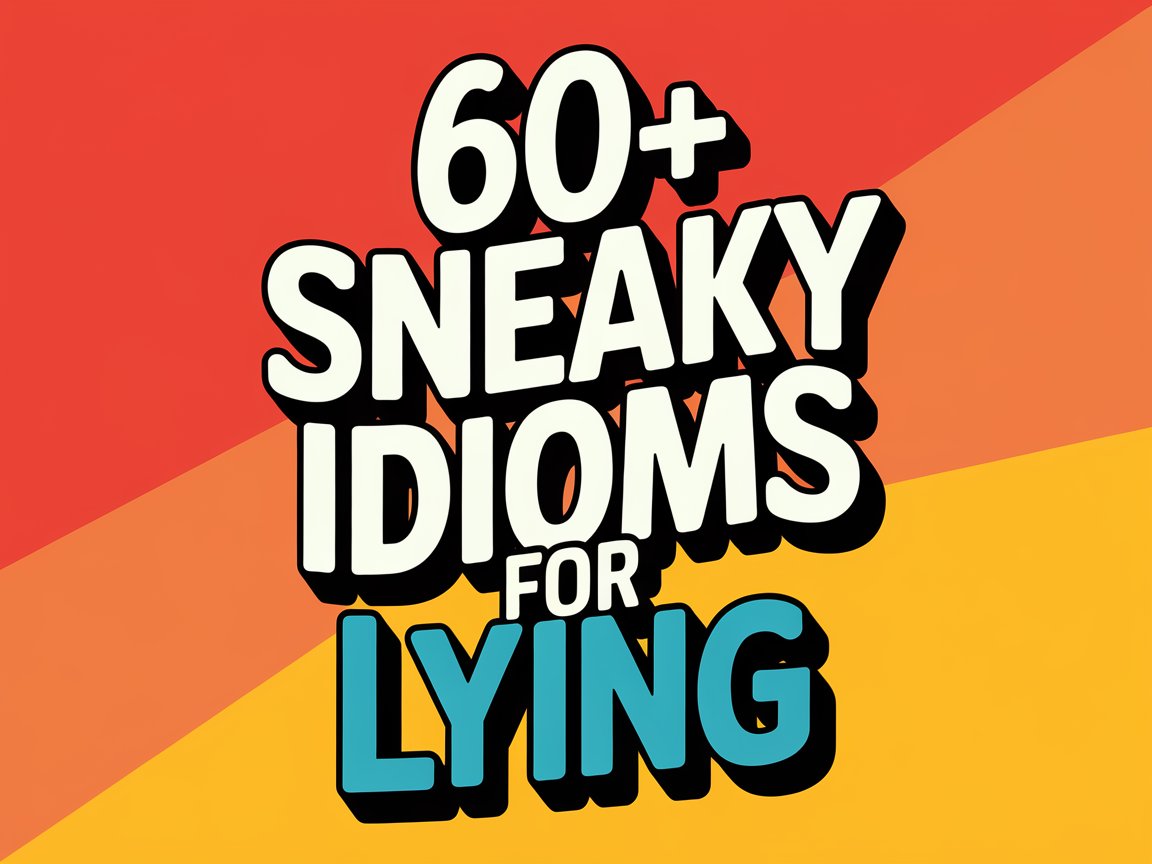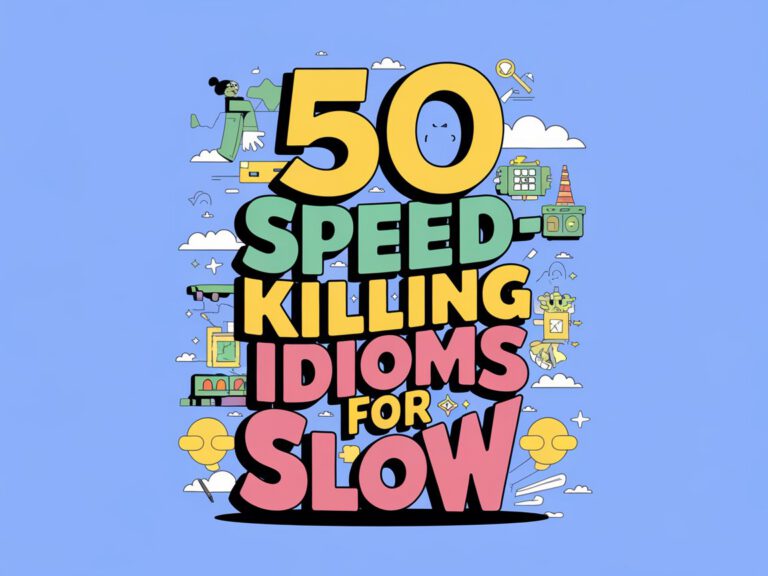60+ Sneaky Idioms for Lying That’ll Blow Your Mind

Ever wondered how many creative ways people talk about lying? From “pulling your leg” to “spinning a yarn,” the English language is packed with colorful expressions for dishonesty. These idioms for lying help us describe everything from harmless white lies to serious deception in ways that are both memorable and fun to use.
Research Shows How Common Lying Really Is
Studies reveal some fascinating facts about deception in our daily lives. Research shows that people tell an average of one to two lies per day, making dishonesty a surprisingly common part of human communication. Scientists have found that children as young as two and a half years old are capable of deception, with 62% of toddlers in one study showing some form of lying behavior.
Linguistic Analysis of Lying
| Characteristic | Truth-tellers | Liars |
|---|---|---|
| Word count | More words | Fewer words |
| Self-references | More “I” statements | Fewer “I” statements |
| Emotion words | Balanced emotions | More negative emotions |
| Story complexity | More detailed | Less complex |
| Concrete details | Balanced mix | More concrete, less abstract |
Research from advanced textual analysis shows that liars construct shorter, less elaborate stories and use more concrete language due to the cognitive load of creating false narratives.
Research from Frontiers in Psychology found that men lied more and were more successful lie-tellers than women in face-to-face interactions. Meanwhile, studies published in the British Journal of Social Psychology revealed that lying comes with a psychological cost – both self-centered and other-oriented lies decreased self-esteem and increased negative emotions in the liar.
“The greatest deception men suffer is from their own opinions.” – Leonardo da Vinci
Now let’s explore the colorful world of lying idioms that help us describe this very human behavior.
🧠 Test Your Lying Idioms Knowledge!
Question 1: What does “pull the wool over someone’s eyes” mean?
1. Pull Someone’s Leg
This classic idiom means to tease or joke with someone by playfully telling a lie. It’s one of the friendliest ways to describe fibbing.
“Don’t believe him, he’s just pulling your leg about the new video game release date.”
The beauty of this expression is that it suggests the lie is harmless and meant in good fun. You’re not trying to hurt anyone – just having a little laugh.
2. Tell a Fib
A fib is a small or harmless lie. It’s like lying’s little cousin – not quite as serious as a full-blown deception.
“She fibbed about finishing her homework before dinner.”
Parents often use this word with kids because it sounds less harsh than “lie.” It’s perfect for those tiny untruths we all tell sometimes.
3. Lie Through Your Teeth
When someone lies boldly and without remorse, they’re lying through their teeth. This person isn’t just stretching the truth – they’re telling whopping lies while looking you straight in the eye.
“She lied through her teeth when she said she hadn’t seen the email.”
This idiom paints a vivid picture. Imagine lies literally coming through someone’s teeth – that’s some serious dishonesty right there.
4. Barefaced Liar
A barefaced liar is someone who lies openly and shamelessly. They don’t even try to hide their dishonesty.
“He’s a barefaced liar—you can’t believe anything he says.”
The word “barefaced” suggests someone who doesn’t cover up or hide their lying. Their dishonesty is right there for everyone to see.
5. Cry Wolf
This idiom comes from the famous fable. To cry wolf means to raise a false alarm or give a false warning, making it hard for people to trust you later.
“Stop crying wolf or nobody will believe you when there’s a real emergency.”
It’s a perfect example of how repeated lying can backfire. The boy who cried wolf learned this lesson the hard way.
6. Weave a Web of Lies
When someone constructs a complex network of deceitful stories, they’re weaving a web of lies. It’s like a spider spinning an intricate trap.
“He wove a web of lies to cover up his involvement in the prank.”
This idiom suggests that lies can become complicated and interconnected. One lie often leads to another, creating a tangled mess.
7. A Lie Has No Legs
This clever saying means a lie cannot stand or survive long because it lacks truth to support it. Without truth as a foundation, lies eventually collapse.
“He told so many stories, but in the end, a lie has no legs.”
It’s a beautiful metaphor. Just like a person needs legs to stand, a story needs truth to last.
8. Whitewash
To whitewash means to conceal or gloss over flaws or wrongdoing by presenting a misleadingly positive image. It’s like painting over rust – the problem is still there, just hidden.
“The company tried to whitewash its history of environmental violations.”
This idiom originally came from literally painting over things with white paint to make them look clean and new.
9. Put on a False Front
This means to act or appear in a way that’s not genuine, often to deceive others. It’s like wearing a mask of lies.
“She put on a false front of confidence even though she was nervous inside.”
We all put on false fronts sometimes, but when it becomes a habit, it can be a form of lying to ourselves and others.
10. Speaking with a Forked Tongue
This idiom means lying deliberately or being deceitful in speech. The image comes from snakes, which have forked tongues.
“Politicians are often accused of speaking with forked tongues.”
The snake comparison isn’t accidental – it suggests someone is sneaky and untrustworthy, just like the serpent in many stories.
11. Talking Out of Both Sides of Your Mouth
When someone says contradictory things to different people to manipulate or mislead, they’re talking out of both sides of their mouth.
“She’s talking out of both sides of her mouth—telling one group yes, the other no.”
This creates a funny mental image of someone literally speaking from both sides of their mouth at once. It’s physically impossible, just like keeping contradictory lies straight.
12. Smoke Screen
A smoke screen is a distraction or false appearance meant to cover up the truth. Like actual smoke, it obscures what’s really happening.
“The flashy project was just a smoke screen for deeper financial problems.”
Military forces use actual smoke screens to hide their movements. This idiom applies the same concept to deception.
13. Full of Beans
While this might sound silly, being full of beans means telling things that are completely untrue or foolish. It’s a playful way to call someone out on their nonsense.
“She claimed to have seen a UFO, but I thought her story was full of beans.”
The phrase suggests someone is full of something worthless – like beans instead of sense.
14. Economical with the Truth
This polite British phrase means telling only part of the truth or being vague in speech. It’s a diplomatic way to say someone’s lying without being too harsh.
Politicians love this phrase because it sounds better than admitting they lied outright.
15. Live a Lie
To live a lie means to have a life built on lies and deception. It’s one of the saddest forms of dishonesty because it affects everything.
This goes beyond telling occasional fibs – it’s about building your entire existence on false foundations.
16. Spin a Tale
When someone tells a story that’s exaggerated or completely made up, they’re spinning a tale. The word “spin” suggests they’re creating something from thin air.
“She spun a yarn about her encounter with a mythical creature.”
Like spinning thread, the storyteller weaves together fictional elements to create their narrative.
17. Pack of Lies
A pack of lies is any statement that’s not true at all. The word “pack” suggests there are multiple lies bundled together.
It’s like getting a package deal – but instead of savings, you get dishonesty.
18. Bold-Faced Lie
Similar to barefaced, a bold-faced lie is told with complete shamelessness. The liar shows no embarrassment or guilt about their dishonesty.
These liars have nerves of steel – they’ll look you right in the eye and lie without flinching.
19. Little White Lie
A little white lie is a small lie that doesn’t cause harm, especially one told to avoid upsetting someone. These are generally considered more acceptable than other lies.
“I told a little white lie about liking her haircut.”
The “white” suggests purity or innocence – these lies come from good intentions.
20. Sugar-Coat
To sugar-coat means to make something unpleasant seem better than it is. It’s like putting sweet coating on bitter medicine.
This isn’t always dishonest – sometimes we sugar-coat things to be kind. But it can cross into lying territory.
21. Come Clean
This means to finally tell the truth after hiding it. It suggests washing away the dirt of deception.
“He finally came clean about breaking the window.”
The cleaning metaphor implies that lies make us dirty, and truth washes us clean.
22. Pull the Wool Over Someone’s Eyes
To pull the wool over someone’s eyes means to deceive or trick them. It creates an image of literally blinding someone with wool.
This idiom suggests the victim can’t see what’s really happening because they’ve been fooled.
23. Bluff Your Way Into Something
Bluffing your way into something means using deception or pretense to gain access to something you don’t deserve.
“He bluffed his way into the exclusive party.”
The term comes from poker, where players bluff about having good cards when they don’t.
24. Call Someone Out on a Lie
This means to directly confront someone about their dishonesty. You’re not letting them get away with it.
It takes courage to call someone out – you’re essentially saying “I know you’re lying.”
25. Be Full of It
A casual way to say someone is telling lies or talking nonsense. It’s more polite than some alternatives but still gets the point across.
The “it” refers to something unpleasant that we don’t want to name directly.
26. Play Fast and Loose
To play fast and loose means to behave dishonestly or recklessly, often by disregarding rules or commitments.
“You can’t trust him; he likes to play fast and loose with the truth.”
This suggests someone who doesn’t take honesty seriously – they treat truth like a game.
27. Hide Behind a Smile
This means to conceal your true emotions or intentions under a pleasant demeanor. The smile becomes a mask for deception.
“He hid behind a smile while delivering bad news.”
Sometimes the most dangerous lies come with the biggest smiles.
28. Lied to My Face
This phrase emphasizes the audacity of lying directly to someone while looking them in the eyes. It’s particularly hurtful because of the personal nature.
“I can’t believe she lied to my face about where she was last night.”
The face-to-face aspect makes the lie feel more personal and insulting.
29. Stretch the Truth
To stretch the truth means to exaggerate or bend facts without telling complete lies. It’s like pulling taffy – you’re changing the shape without changing the basic material.
This is often seen as less serious than outright lying, though it’s still dishonest.
30. Bend the Facts
Similar to stretching the truth, bending the facts means saying something not completely true to achieve a goal. You’re twisting reality to fit your needs.
Facts should be straight and solid, but some people like to bend them like flexible rules.
31. Ring True
When something rings true, it gives the impression of being honest. It’s the opposite of most idioms on this list.
“His explanation doesn’t ring true to me.”
The phrase comes from testing coins – real ones ring with a clear sound when dropped.
32. See Right Through Someone
This means to understand the truth about someone despite their attempts to deceive. You’re not fooled by their act.
Some people are like glass – you can see right through their lies.
33. Monkey Business
Monkey business refers to dishonest actions or behavior intended to trick someone. It suggests playful but potentially harmful mischief.
Monkeys are known for being tricky and mischievous, hence the comparison.
34. Nothing Could Be Further from the Truth
This emphatic phrase means something is a complete lie. It’s a strong way to deny false accusations.
It suggests the lie is so far from reality that there’s an enormous distance between them.
35. Funny Business
Similar to monkey business, funny business refers to dishonest actions meant to trick people. The “funny” doesn’t mean humorous – it means suspicious.
“I suspect there’s some funny business going on with those numbers.”
36. Spill Your Guts
This colorful American slang means to tell someone everything you know, usually the truth after hiding it.
The graphic imagery suggests someone literally emptying their insides – in this case, of secrets and lies.
37. In All Honesty
This phrase means to tell you the truth, especially when the truth isn’t pleasant to hear. It’s often used before admitting something difficult.
Ironically, when someone says “in all honesty,” it sometimes makes you wonder if they weren’t being honest before.
38. If Truth Be Told
If truth be told means to be honest about something. It’s an old-fashioned way to introduce a truthful statement.
This phrase suggests that truth is something special that needs to be announced.
39. Play Games
To play games means to try to deceive someone through manipulation or dishonesty. You’re treating serious matters like entertainment.
“Stop playing games and tell me what really happened.”
40. Lie Like a Rug
This funny idiom means someone lies constantly and obviously. Rugs lie flat on the floor – they don’t move or change, just like some people’s commitment to dishonesty.
It’s a humorous way to describe someone who lies so much it’s become their default mode.
41. Lie Like a Trooper
Similar to lying like a rug, this means someone lies frequently and skillfully. Troopers (soldiers) were sometimes stereotyped as being good at tall tales.
42. Couldn’t Lie Straight in Bed
This British idiom describes someone who lies so much they can’t even be honest about simple things. Even in bed – the most natural, comfortable position – they’d somehow manage to be dishonest.
It’s an exaggerated way to say someone is completely untrustworthy.
43. Tell a Tall Tale
A tall tale is an exaggerated or unbelievable story. These aren’t meant to deceive seriously – they’re more like entertaining lies.
“He told a tall tale about catching a fish as big as a car.”
The “tall” suggests something that stretches up beyond normal size, just like these exaggerated stories.
44. Fish Story
Similar to tall tales, a fish story is an exaggerated account, especially about the size of something. It comes from fishermen exaggerating their catches.
“That sounds like a fish story to me.”
Every fisherman knows that the fish that got away was always bigger than the ones they caught.
45. Telling Porkies
This British slang means telling lies. A “porky” is short for “pork pie,” which rhymes with “lie” in Cockney rhyming slang.
It’s a playful way to accuse someone of dishonesty without being too harsh.
46. Load of Bull
This means something is complete nonsense or lies. It’s a polite way to say something stronger and more offensive.
“His excuse was a complete load of bull.”
The barnyard reference suggests something smelly and worthless.
47. Cock and Bull Story
A cock and bull story is an absurd, unbelievable tale. It’s so ridiculous that nobody should believe it.
The phrase combines two animals known for making noise – suggesting the story is all noise and no substance.
48. Blow Smoke
To blow smoke means to deceive someone with false or exaggerated statements. Like actual smoke, these statements obscure the truth.
“He’s just blowing smoke about his connections to celebrities.”
49. Snow Job
A snow job is an attempt to deceive someone with elaborate lies or flattery. Like being buried in snow, the victim gets overwhelmed by the deception.
This American slang suggests covering someone with so much false information they can’t see through it.
50. Feed Someone a Line
This means to tell someone something untrue to deceive them. You’re literally feeding them lies like food.
The “line” might come from fishing – you’re baiting someone with false information.
51. Make Something Up
To make something up means to invent a story or excuse that isn’t true. You’re creating fiction and presenting it as fact.
“I think you’re just making that up.”
52. Lie Doggo
This British expression means to stay hidden or keep quiet, often to avoid telling the truth. A dog lying down stays still and quiet.
53. Nail a Lie
To nail a lie means to prove that something is false. You’re pinning down the dishonesty so it can’t escape.
Like nailing a piece of wood in place, you’re making the lie’s falseness permanent and obvious.
54. Put the Lie To
This formal phrase means to prove that something is false. You’re demonstrating that a claim is dishonest.
55. Give the Lie To
Similar to “put the lie to,” this means to show that something is false. You’re exposing the dishonesty.
56. Lie at Someone’s Door
This means to be someone’s responsibility or fault. The lie is sitting right at their doorstep – they can’t avoid ownership.
57. Lie Low
To lie low means to stay hidden or avoid attention, often to avoid having to tell the truth or face consequences.
“After the scandal broke, he decided to lie low for a while.”
58. That Ain’t No Lie
This double negative actually means something is definitely true. It’s an emphatic way to confirm honesty.
Despite being about lying, this phrase actually emphasizes truth.
59. No Lie
Similar to “that ain’t no lie,” this phrase means something is genuinely true. You’re emphasizing your honesty.
“No lie, I actually saw a celebrity at the grocery store.”
60. The Big Lie
The big lie refers to a major falsehood told repeatedly until people start believing it. It’s often used in political contexts.
This concept shows how powerful repeated lies can become.
61. Dirty Lie
A dirty lie is a particularly nasty or harmful falsehood. It’s not just dishonest – it’s meant to hurt someone.
The “dirty” suggests something unclean and morally wrong.
62. Filthy Lie
Even worse than a dirty lie, a filthy lie is extremely offensive and harmful. It’s the worst kind of dishonesty.
Frequently Asked Questions
Q: What’s the difference between a fib and a lie?
A: A fib is generally considered a small, harmless lie, while a lie can be more serious and potentially harmful. Fibs are often told to spare someone’s feelings or avoid minor trouble.
Q: Are “white lies” really okay to tell?
A: White lies are generally more socially acceptable because they’re meant to protect someone’s feelings rather than for personal gain. However, research shows that even well-intentioned lies can have psychological costs for the liar.
Q: Why do we have so many idioms about lying?
A: Lying is a universal human behavior that comes in many forms – from harmless jokes to serious deception. Having multiple idioms helps us express different types and degrees of dishonesty.
Q: Do men and women lie differently?
A: Research suggests that men lie more frequently and are more successful at lying than women, though both genders experience negative psychological effects from lying.
Q: Can using these idioms help me sound more natural in English?
A: Yes! Idioms are an important part of natural English conversation. However, make sure you understand the context and appropriateness of each idiom before using it.
Conclusion
The English language’s rich collection of lying idioms reveals something fascinating about human nature – we need many different ways to talk about dishonesty because it comes in so many forms. From playful leg-pulling to serious deception, these colorful expressions help us navigate the complex world of truth and lies.
Here’s a bonus insight: While these idioms are fun to learn and use, remember that research consistently shows lying has psychological costs. Even when lies go undetected, they decrease self-esteem and increase negative emotions in the liar. So while you’re mastering these entertaining expressions, consider using them more for understanding others than for your own deceptive purposes.
The next time someone tries to pull the wool over your eyes or tells you a cock and bull story, you’ll not only recognize their dishonesty – you’ll have dozens of creative ways to call them out on it. Just remember: with great idiom power comes great responsibility to use it wisely!
Helpful Resources
- https://pmc.ncbi.nlm.nih.gov/articles/PMC9894434/
- https://www.americanscientist.org/article/the-origins-of-lying-and-deception-in-everyday-life
- https://www.frontiersin.org/journals/psychology/articles/10.3389/fpsyg.2022.820923/full
- https://www.psypost.org/new-research-brings-to-light-the-psychological-costs-of-lying/
- https://www.azquotes.com/quotes/topics/deception.html
- https://idiominsider.com/idioms-for-lying/
- https://idiomandmetaphor.com/idioms-for-lying/
- https://langeek.co/en/vocab/subcategory/2556/word-list
- https://idioms.thefreedictionary.com/lie
- https://booyya.com/en/course/lyingwithcapthecat/
- https://enguroo.com/2024/05/31/truth-lies-idioms/
- https://www.italki.com/en/post/question-172426
- https://dictionary.cambridge.org/us/topics/honesty-and-dishonesty/lies-lying-and-hypocrisy/
- https://blog.elsaspeak.com/en/understanding-and-using-idioms-in-english-why-its-important/






